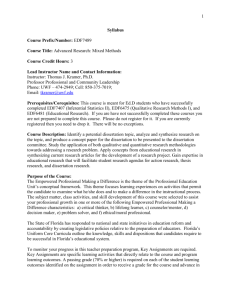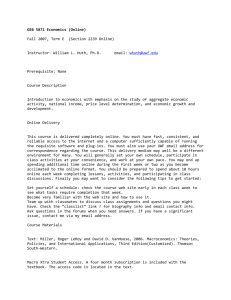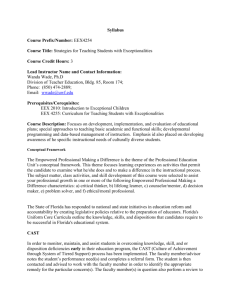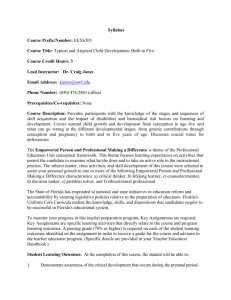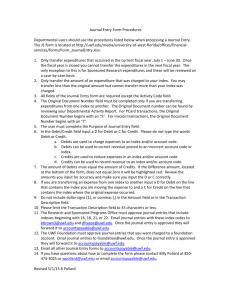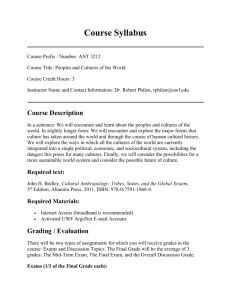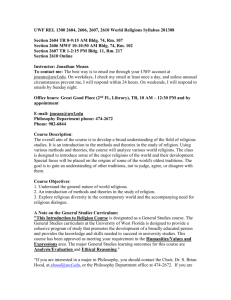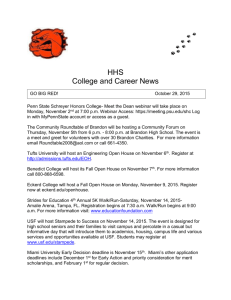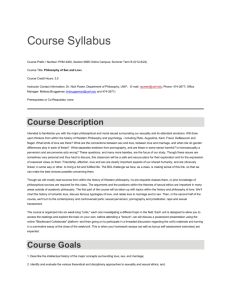Proposal for a Behavioral Institute at UWF
advertisement
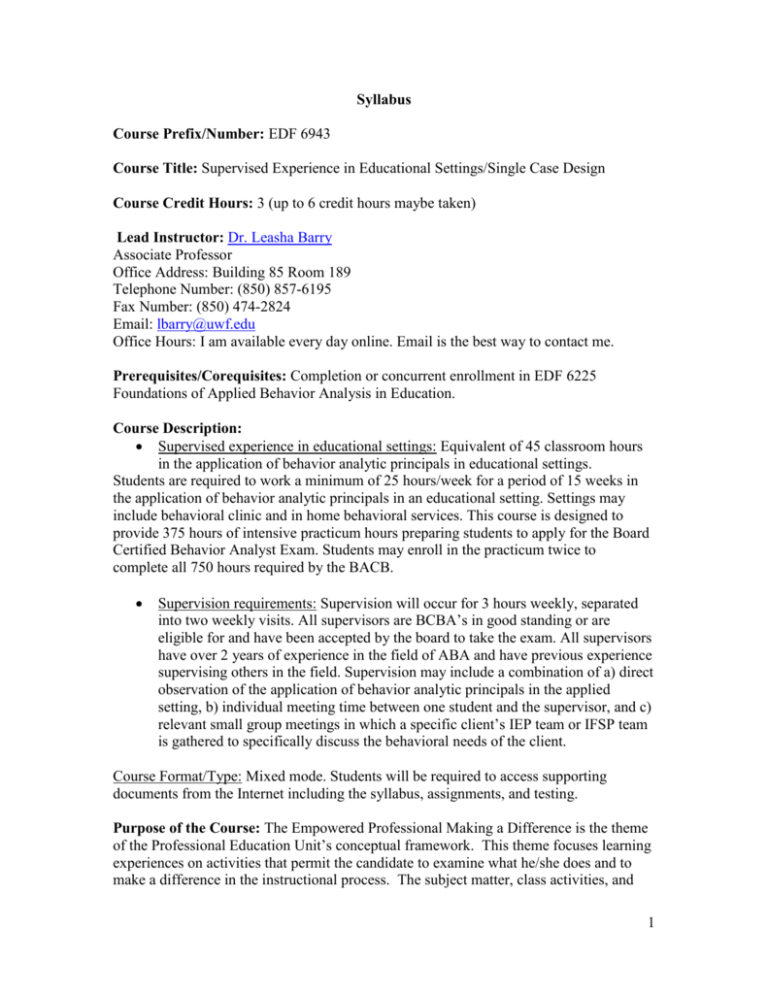
Syllabus Course Prefix/Number: EDF 6943 Course Title: Supervised Experience in Educational Settings/Single Case Design Course Credit Hours: 3 (up to 6 credit hours maybe taken) Lead Instructor: Dr. Leasha Barry Associate Professor Office Address: Building 85 Room 189 Telephone Number: (850) 857-6195 Fax Number: (850) 474-2824 Email: lbarry@uwf.edu Office Hours: I am available every day online. Email is the best way to contact me. Prerequisites/Corequisites: Completion or concurrent enrollment in EDF 6225 Foundations of Applied Behavior Analysis in Education. Course Description: Supervised experience in educational settings: Equivalent of 45 classroom hours in the application of behavior analytic principals in educational settings. Students are required to work a minimum of 25 hours/week for a period of 15 weeks in the application of behavior analytic principals in an educational setting. Settings may include behavioral clinic and in home behavioral services. This course is designed to provide 375 hours of intensive practicum hours preparing students to apply for the Board Certified Behavior Analyst Exam. Students may enroll in the practicum twice to complete all 750 hours required by the BACB. Supervision requirements: Supervision will occur for 3 hours weekly, separated into two weekly visits. All supervisors are BCBA’s in good standing or are eligible for and have been accepted by the board to take the exam. All supervisors have over 2 years of experience in the field of ABA and have previous experience supervising others in the field. Supervision may include a combination of a) direct observation of the application of behavior analytic principals in the applied setting, b) individual meeting time between one student and the supervisor, and c) relevant small group meetings in which a specific client’s IEP team or IFSP team is gathered to specifically discuss the behavioral needs of the client. Course Format/Type: Mixed mode. Students will be required to access supporting documents from the Internet including the syllabus, assignments, and testing. Purpose of the Course: The Empowered Professional Making a Difference is the theme of the Professional Education Unit’s conceptual framework. This theme focuses learning experiences on activities that permit the candidate to examine what he/she does and to make a difference in the instructional process. The subject matter, class activities, and 1 skill development of this course were selected to assist your professional growth in one or more of the following Empowered Professional Making a Difference characteristics: a) critical thinker, b) lifelong learner, c) counselor/mentor, d) decision maker, e) problem solver, and f) ethical/moral professional. The State of Florida has responded to national and state initiatives in education reform and accountability by creating legislative policies relative to the preparation of educators. Florida’s Uniform Core Curricula outline the knowledge, skills and dispositions that candidates require to be successful in Florida’s educational system. To monitor your progress in this teacher preparation program, Key Assignments are required. Key Assignments are specific learning activities that directly relate to the course and program learning outcomes. A passing grade (70% or higher) is required on each of the student learning outcomes identified on the assignment in order to receive a grade for the course and advance in the teacher education program. (Specific details are provided in your Teacher Education Handbook.) Course Student Learning Outcomes: Students will demonstrate proficiency in the following areas: 1. Demonstrate increased ability to apply behavior analytic principals in the appropriate setting of their choice. 2. Develop an understanding of system support for behavior analysis and change including staff development, monitoring, and securing support. 3. Students will be able to use behavior change procedures in an applied setting. 4. Students will be able to identify, define, and explain behavior change procedures in a variety of settings and with a variety of students/clients/consumers. Florida Educator Accomplished Practices (Professional): http://www.fldoe.org/dpe/publications/professional4-99.pdf NCATE Standards: http://ncate.org/Standards/NCATEUnitStandards/UnitStandardsinEffect2008/tabid/476/Default.aspx NATIONAL BOARD FOR PROFESSIONAL TEACHING STANDARDS http://www.nbpts.org/the_standards/standards_by_cert ADVANCED SPECIAL EDUCATION CONTENT STANDARDS -CEC http://www.cec.sped.org/Content/NavigationMenu/ProfessionalDevelopment/ProfessionalStandards/Profes sional_Standa.htm Course Alignments by Assessments, Outcomes, and Standards: Project Name and Assessment Conceptual Framework Outcomes Course SLOs NCATE FEAPs Standard (professional) 1 SPA NBPTS 2 Tool Functional Behavior Assessment with intervention plan (rubric) Research Paper (Rubric) (Characteristics) Indicator Critical Thinker Decision Maker Ethical/Moral Professional 3 4 1a, 1b. 1d, 1e, 1f, 1g 1.1, 1.5, 2.2, 3.6, 5.7, 10.1 38.11, 1, 3, 38.12, 10, 11 38.13, 38.17 Critical Thinker Ethical/Moral Professional 1 2 1c, 1b, 1d, 1e, 1f, 1g 1.1, 1.5, 2.1, 38.13, 1, 2, 3, 2.3, 5.6, 11.5, 38.15, 5, 18 11.6, 11.7 38.19 Topics Covered: All areas of applied behavior analysis maybe relevant to individual experiences. The focus of content in supervision will be on the application of principals in context regarding specific target behaviors for specific students/clients/consumers as appropriate. Setting & Client Requirements: Students are free to choose the setting in which they conduct their hours. Confidentiality forms must be provided by the setting administration to the supervisor of the course so that all aspects of cases can be discussed. The setting must provide at least 25 hours/weekly of opportunities to work in the are of applied behavior analysis. This can include conducting functional assessments, developing, implementing, and monitoring behavioral programming, writing behavior support plans, and supervising others completing these tasks. Clients/students/consumers must be individuals with, or at risk for, developmental disabilities as identified by state funding sources through a school district or other state funding agency. Settings will be in either districts or within private behavior analytic therapy companies, or clinics. Tentative Schedule: Schedule is set between the student and the supervised instructor but must fulfill 25 hours a week with 2 weekly meetings with supervised instructor. Required Texts: Kennedy, C. H. (2005). Single-case designs for educational research. Boston: Pearson/Allyn & Bacon. (ISBN: 0205340237) O’Neill, R. E., Horner, R. H., Albin, R. W., Sprague, J. R., Storey, K., & Newton, J. S. (1997). Functional assessment of problem behavior: A practical assessment guide (Second Edition). Pacific Grove, CA: Brookes/Cole Publishing. 3 Cooper, J. O., Heron, T. E., & Heward, W. L. (2007). Applied Behavior Analysis.(2nd Ed.). Prentice Hall. (ISBN: O-675-20223-X) Notes: Setting & Client Requirements: Students are free to choose the setting in which they conduct their hours. Confidentiality forms must be provided by the setting administration to the supervisor of the course so that all aspects of cases can be discussed. The setting must provide at least 25 hours/weekly of opportunities to work in the are of applied behavior analysis. This can include conducting functional assessments, developing, implementing, and monitoring behavioral programming, writing behavior support plans, and supervising others completing these tasks. Clients/students/ consumers must be individuals with, or at risk for, developmental disabilities as identified by state funding sources through a school district or other state funding agency. Settings will be in either districts or within private behavior analytic therapy companies, or clinics. Supervision requirements: Supervision will occur for 3 hours weekly, separated into two weekly visits. All supervisors are BCBA’s in good standing or are eligible for and have been accepted by the board to take the exam. All supervisors have over 2 years of experience in the field of ABA and have previous experience supervising others in the field. Supervision may include a combination of a) direct observation of the application of behavior analytic principals in the applied setting, b) individual meeting time between one student and the supervisor, and c) relevant small group meetings in which a specific client’s IEP team or IFSP team is gathered to specifically discuss the behavioral needs of the client. Course Format/Type: Mixed mode. Students will be required to access supporting documents from the Internet including the syllabus, assignments, and testing. Grading / Evaluation: The course is graded on a Satisfactory/Unsatisfactory basis. 1. 2. Participation in two weekly supervision meetings is mandatory. Any missed meetings will need to be rescheduled with the supervisor to attain a passing grade. 25 hours of weekly ABA practice is mandatory. Any missed hours must be rescheduled so that students actually complete the full 375 hours of ABA practice. Supervisors will have discretion to assign S/U grades for the practicum. Supervisors will complete progress forms for each student, twice weekly, over the course of 15 weeks. Provided that reasonable progress is made toward professional development goals in the application of ABA in context, and assuming that the student has performed in a professional and ethical manner, a satisfactory grade can be awarded. The coordinator of the BCBA approved sequence at UWF. Dr. Leasha M. Barry, will review all supervision experiences provided through this program. Incompletes (I) will not be given except under very extreme circumstances. Please see the 4 UWF catalog for rules about Incompletes and course withdrawals. Special Technology Requirements: Students need to activate their Argo account and use UWF email for this course. Students need to have access to the Internet to participate in the on-line components of the course. Computer labs are available on the UWF main campus that have the needed technology prerequisites. Plagiarism & Fraud: Committing any academic misconduct including plagiarism or fraud is punishable by expulsion from the University System. See UWF’s Student Life Handbook page 48 for regulations and other sanctions. Ignorance regarding what constitutes academic misconduct will not excuse you from sanctions. If you commit plagiarism or fraud in this course you will fail this course without exception and additional sanctions may be pursued against you. Statement of the University Policy on Academic Conduct: The Student Code of Conduct sets forth the rules, regulations and expected behavior of students enrolled at the University of West Florida. Violations of any rules, regulations, or behavioral expectations may result in a charge of violating the Student Code of Conduct. It is the student’s responsibility to read the Student Code of Conduct and conduct themselves accordingly. You may access the current Student Code of Conduct at http://www.uwf.edu/judicialaffairs. Expectations for Academic Conduct/Plagiarism Policy: Academic Conduct Policy: (Web Format) | (PDF Format) (RTF Format) Assistance: Students with special needs who require specific examination-related or other course-related accommodations should contact the Student Disability Resource Center (SDRC), sdrc@uwf.edu, 850.474.2387. SDRC will send an email to the instructor that specifies any recommended accommodations. UWF TurnItIn notice: UWF maintains a university license agreement for an online text matching service called TurnItIn. At my discretion I will use the TurnItIn service to determine the originality of student papers. If I submit your paper to TurnItIn, it will be stored in a TurnItIn database for as long as the service remains in existence. If you object to this storage of your paper: 1. You must let me know no later than two weeks after the start of this class. 2. I will utilize other services and techniques to evaluate your work for evidence of appropriate authorship practices. Syllabus Notice of Change: Although this syllabus is intended for multiple audiences and incorporates the minimum course criteria, the content of this syllabus may change 5 based on individual instructor’s specifications. Any modifications to this syllabus will be announced during the first week of the semester. Other Technology Requirements: Computer labs are available on the UWF main campus that have the needed technology prerequisites. Elements required in CCRs for course changes: Midterm and Final exams 6
